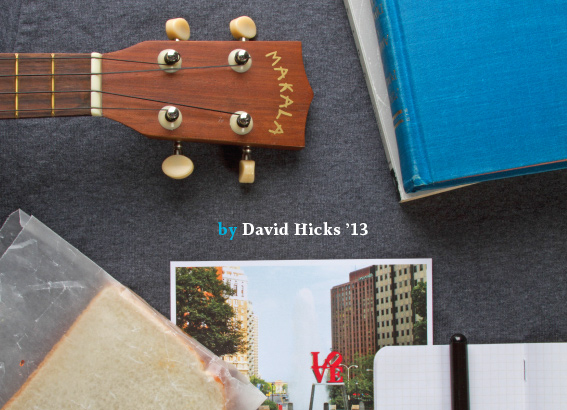STILLPOINT Archive: last updated 07/10/2012

My loftiest dreams seemed to die when I went to college. Perhaps it was inevitable. Hard realities and cold calculations, the very foundation of scholarly pursuits, sometimes have an eerie effect on the imagination. But only a few years before, it was this imagination that Charles liked about me. I wanted to change the world. I was passionate, visionary, angsty—and I knew it.
Charles had been homeless for 28 years, and he thrived on the Saturday mornings when a group of students would bring sandwiches and social contact. He told us our spirit was contagious. It gave him a certain hope that he didn’t find with older, more mature, people.
I met Charles in the summer of my junior year of high school, during one of my first trips into Philadelphia. I wanted to understand homelessness. He was sitting on a bench in Love Park with an approachable aura. He was 64 and black, with a huge smile that lit his tired face and forced you to smile too. Charles’ story fueled my fantastical pursuit of world justice: 28 years ago he had lost his factory job in the city due to health issues, initiating a downhill spiral of events that included separation from his six children and the death of his wife. His life embodied my stereotype of the homeless.
Because of this, my interactions with Charles were significant for reasons that went beyond him. This homeless man, with his big grin and tragic story, was an image of unjust suffering, backed into a corner by circumstances beyond his control. I imagined that he and I, working together, would recover the shards of his broken life, and reassemble them. In so doing, we would conquer the injustices of society in the name of the homeless everywhere.
If I could repossess my youthful imagination from those high school days, I would do it in a second. But when I began college and visited Boston’s homeless, my visits no longer summoned the hopeful energy of my time in high school. The analytical rigor of my classroom life now prohibited me from showing men like Charles genuine warmth. My studies of the world were somehow keeping me from being a true part of it.
Taking a break from the occasional heaviness of critical thinking has been a good thing. It lets me dream beyond the possible.
Overcoming this intellectual handicap on my imagination has taken a lot of work. Only recently have I begun to recover the freedom to dream again. Attaining that freedom—escaping from my calculative approach to learning—has taken conscious efforts: Now, I set aside time each day to write creatively, improvise on the piano or read some good fiction. Somehow, it helps.
Taking a break from the occasional heaviness of critical thinking has been a good thing. It lets me dream beyond the possible. It’s not about what the dream is—I find my vision of justice-for-all-of-the-homeless to be pretty unrealistic—but it’s the dreaming that is important. Dreaming invigorates our intellectual pursuits.
While the pragmatism of our elders has largely benefited society as we know it, it seems to operate without the youthful creativity that once inspired it. My generation blames these leaders for today’s problems. We look at poverty, violence, suffering, and see little more than failed systems propagated by conventional leadership. We are wary skeptics and impassioned critics. We are enemies of the same Enemy, working together to imagine alternatives to the way things are.
And while we may be impractical, we are good at dreaming. We see the value in opening our minds to what can look like pipe dreams to others. Sometimes we appear naïve, because we are naïve. But neither school, nor the larger institutional contexts of our lives as we grow up, should be designed to convince us that such naïveté is wholly a bad thing.
Charles moved to North Carolina to live with his daughter in 2009. He found her after my dad, a businessman, helped me locate and contact his daughter, raise money for his travel expenses, and prepare some information he would need on his arrival. I couldn’t have done it without my father, who understood how the world works—and he wouldn’t have done it without me, who fretted about a world that doesn’t work.
A marriage of the imaginative creativity of my generation and the practicality of my elders would be a very, very good thing.
 David Hicks, from Wayne, Pennsylvania, is triple-majoring in philosophy, English and history. He is fascinated by a wide variety of mammals, and interested in practicing law. This essay was originally published in the "On Leadership" series in the online version of the Washington Post. [email protected]
David Hicks, from Wayne, Pennsylvania, is triple-majoring in philosophy, English and history. He is fascinated by a wide variety of mammals, and interested in practicing law. This essay was originally published in the "On Leadership" series in the online version of the Washington Post. [email protected]
| Share this story: |   |